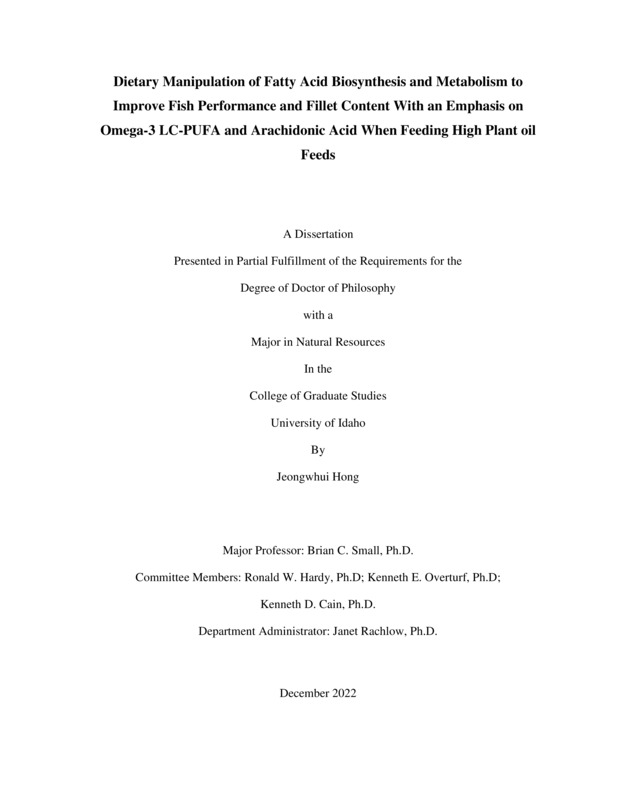DIETARY MANIPULATION OF FATTY ACID BIOSYNTHESIS AND METABOLISM TO IMPROVE FISH PERFORMANCE AND FILLET CONTENT WITH AN EMPHASIS ON OMEGA-3 LC-PUFA AND ARACHIDONIC ACID WHEN FEEDING HIGH PLANT OIL FEEDS
Hong, Jeongwhui. (2022-12). DIETARY MANIPULATION OF FATTY ACID BIOSYNTHESIS AND METABOLISM TO IMPROVE FISH PERFORMANCE AND FILLET CONTENT WITH AN EMPHASIS ON OMEGA-3 LC-PUFA AND ARACHIDONIC ACID WHEN FEEDING HIGH PLANT OIL FEEDS. Theses and Dissertations Collection, University of Idaho Library Digital Collections. https://www.lib.uidaho.edu/digital/etd/items/hong_idaho_0089e_12514.html
- Title:
- DIETARY MANIPULATION OF FATTY ACID BIOSYNTHESIS AND METABOLISM TO IMPROVE FISH PERFORMANCE AND FILLET CONTENT WITH AN EMPHASIS ON OMEGA-3 LC-PUFA AND ARACHIDONIC ACID WHEN FEEDING HIGH PLANT OIL FEEDS
- Author:
- Hong, Jeongwhui
- Date:
- 2022-12
- Program:
- Natural Resources
- Subject Category:
- Animal sciences
- Abstract:
-
Fish oils have been used as the primary source of dietary lipid in aquafeeds, especially for salmonids and marine species, which require the supply of long-chain polyunsaturated fatty acids (LC-PUFA) such as eicosapentaenoic acid (20:5n-3, EPA), docosahexaenoic acid (22:6n-3, DHA) and arachidonic acid (20:5n-6, ARA), considered essential fatty acids for many species. However, fish oils have been in increasingly higher demand in the aquaculture industry, while fixed or diminishing supplies have resulted in higher prices, creating the need for alternative oils. In recent decades, extensive research has been conducted to find alternative, sustainable lipid sources for aquafeeds. Plant-derived oils such as soybean, canola, and linseed oil have been widely used and studied in the aquaculture field because they are reasonably cost-effective and readily available. However, the increasing use of such oils has resulted in the decline of beneficial omega-3 fatty acids in the fish fillet, thereby reducing the nutritional value to the final consumer. This thesis aims to investigate fatty acid metabolism by supplementing cholesterol, which plays a vital role in stimulating fatty acid β-oxidation and the conversion of α-linolenic acid (ALA) to DHA, to plant oils (soybean and linseed oils) widely used in aquafeed. Furthermore, this thesis includes an investigation of a novel lipid source to replace fish oil in the trout diet and to better understand fatty acid metabolism in an effort to increase beneficial omega-3 fatty acids in the fish fillet through metabolic processes. Following these studies, experiments were conducted to examine the effects of ARA, known as an essential fatty acid in some marine carnivorous species, on fatty acid metabolism, growth performance, health, and inflammatory responses of different size classes of trout. The first study demonstrated that fish fed 100% of linseed oil with cholesterol supplementation had significantly higher weight gain and feed intake compared to other plant-based diets. In addition, cholesterol supplementation numerically increased EPA and DHA levels in fish fillet when linseed oil was provided above 50%. The second study was conducted over a complete production cycle to evaluate a new transgenic canola oil (LatitudeTM oil; Cargill) high in EPA, DPA and, DHA compared with conventional canola oil as a substitute for fish oil in rainbow trout feeds. The results of that study demonstrated that LatitudeTM oil improves fish growth and yields elevated n-3 long-chain polyunsaturated fatty acid content in the fillet, making it a candidate lipid source for use in rainbow trout feeds. However, both intestinal inflammation and size and number of absorptive vacuoles showed significant differences among diet with the distal intestine of fish fed 100% LatitudeTM oil having a reduction in size and number of absorptive vacuoles and signs of inflammation. The last two studies, evaluating the effect of ARA in two different stages, swim-up and sub-adult, demonstrated that dietary ARA neither negatively nor positively affected growth performance during both stages. However, dietary ARA improved the immune and inflammatory response to hypoxia and high temperature by enhancing the activation of antioxidant pathways and inhibiting pro-inflammatory responses.
- Description:
- doctoral, Ph.D., Natural Resources -- University of Idaho - College of Graduate Studies, 2022-12
- Major Professor:
- Small, Brian
- Committee:
- Cain, Kenneth; Hardy, Ronald; Overturf, Kenneth; Rachlow, Janet
- Defense Date:
- 2022-12
- Identifier:
- Hong_idaho_0089E_12514
- Type:
- Text
- Format Original:
- Format:
- application/pdf
- Rights:
- In Copyright - Educational Use Permitted. For more information, please contact University of Idaho Library Special Collections and Archives Department at libspec@uidaho.edu.
- Standardized Rights:
- http://rightsstatements.org/vocab/InC-EDU/1.0/

